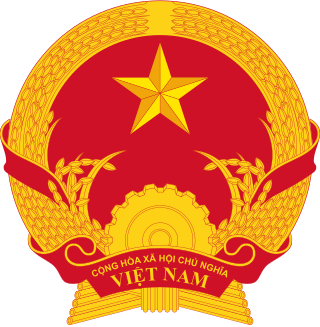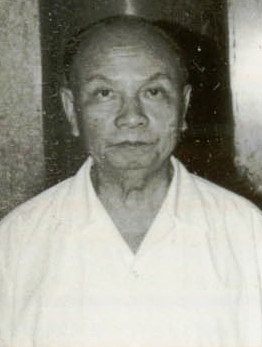
The politics of Vietnam is dominated by a single party under an authoritarian system, the Communist Party of Vietnam (CPV). The President of Vietnam is the head of state, and the Prime Minister of Vietnam is the head of government. Both of these offices are separate from the General Secretary of the Communist Party of Vietnam, who leads the CPV and is head of the Politburo and the Central Military Commission. The General Secretary is thus the de facto highest position in the Vietnamese politics.

The Communist Party of Vietnam (CPV) is the founding and sole legal party of the Socialist Republic of Vietnam. Founded in 1930 by Hồ Chí Minh, the CPV became the ruling party of North Vietnam in 1954 and then all of Vietnam after the collapse of the South Vietnamese government following the Fall of Saigon in 1975. Although it nominally exists alongside the Vietnamese Fatherland Front, it maintains a unitary government and has centralized control over the state, military, and media. The supremacy of the CPV is guaranteed by Article 4 of the national constitution. The Vietnamese public generally refer to the CPV as simply "the Party" or "our Party".

William George Meany was an American labor union administrator for 57 years. He was important for the creation of the AFL–CIO and served as the AFL–CIO's first president, from 1955 to 1979.

The Canadian Labour Congress, or CLC is a national trade union centre, the central labour body in Canada to which most Canadian labour unions are affiliated.

Trade unions in India are registered and file annual returns under the Trade Union Act (1926). Statistics on trade unions are collected annually by the Labour Bureau of the Ministry of Labour, Government of India. According to the latest data released for 2012, there were 16,154 trade unions with a combined membership of 9.18 million, based on returns from 15 states out of a total of 28 states and 9 union territories. The trade union movement in India is largely divided along political lines and follows a pre-Independence pattern of overlapping interactions between political parties and unions. The net result of this system is debated, as it has both advantages and disadvantages. According to data submitted by various trade unions to the Ministry of Labour and Employment as part of a survey, INTUC, with a combined membership of 33.3 million, emerged as the largest trade union in India as of 2013.

Trường Chinh, born Đặng Xuân Khu; 9 February 1907 – 30 September 1988) was a Vietnamese communist political leader, revolutionary and theoretician. He was one of the key figures of Vietnamese politics and the important Vietnamese leaders for over 40 years. He played a major role in the anti-French colonialism movement and finally after decades of protracted war in Vietnam, the Vietnamese defeated the colonial power. He was the think-tank of the Communist Party who determined the direction of the communist movement, particularly in the anti-French colonialism movement. After the declaration of independence in September 1945, Trường Chinh played an important role in shaping the politics of the Democratic Republic of Vietnam (DRV) and creating the socialist structure of the new Vietnam.
The Australian Workers' Union (AWU) is one of Australia's largest and oldest trade unions. It traces its origins to unions founded in the pastoral and mining industries in the late 1880s and it currently has approximately 80,000 members.

The All-China Federation of Trade Unions (ACFTU) is the national trade union center and people's organization of the People's Republic of China. It is the largest trade union in the world with 302 million members in 1,713,000 primary trade union organizations. The ACFTU is divided into 31 regional federations and 10 national industrial unions. The ACFTU is the country's sole legally mandated trade union, with which all enterprise-level trade unions must be affiliated. There has been dispute over whether ACFTU is an independent trade union or a trade union at all. The federation owns a higher education institution—the China University of Labor Relations.

The Chairman of the National Assembly of Vietnam is the legislative speaker of the Socialist Republic of Vietnam, presiding over the National Assembly. The National Assembly is, in the words of the constitution, "the highest representative organ of the people; the highest organ of state power". This position was formerly designated as the Chairman of the Standing Committee of the National Assembly of Vietnam from 1946 to 1981.

The Political Bureau (Politburo) of the Communist Party of Vietnam Central Committee is the highest body of the Communist Party of Vietnam (CPV) in between gatherings of the National Congress and of the plenary sessions Central Committee. According to Party rules, the Politburo directs the general orientation of the government, and by that, it has dominant power in the politics of Vietnam.

The 11th Central Committee of the Communist Party of Vietnam was elected at the 11th National Congress of the Communist Party of Vietnam. The 11th Central Committee elected the 11th Politburo and the 11th Secretariat.
Ho Chi Minh Thought is a political philosophy that builds upon Marxism–Leninism and the ideology of Vietnamese revolutionary Ho Chi Minh. It was developed and codified by the Communist Party of Vietnam and formalised in 1991. The term is used to cover political theories and policies considered as representing a form of Marxism–Leninism that has been adapted to Vietnamese circumstances and history. The ideology includes views on the basic issues of the Vietnamese Revolution, specifically the development and application of Marxism–Leninism to the material conditions of Vietnam.
The Trade Union International of Workers in Tourism and Hotels (HOTOUR) is a trade union international affiliated with the World Federation of Trade Unions
The Council of Non-European Trade Unions (CNETU) was a national trade union federation bringing together unions representing black African workers in South Africa.

On 27 January 2016, the 12th National Congress elected 180 individuals to serve as members of the 12th Central Committee of the Communist Party of Vietnam (CPV) for the electoral term 2016–2021. The Central Committee is the highest decision-making institution in the CPV and Vietnam when the Party's National Congress and the Politburo are adjourned. In between congresses, the Central Committee is responsible for organising and directing the implementation of the Party's Political Platform, Charter, and resolutions adopted at the National Congress. Furthermore, it adopts guidelines and policies in all relevant fields, domestic or foreign. In addition, the sitting Central Committee is responsible for convening the next National Congress. Members of the Central Committee have the right to elect and remove the General Secretary of the Central Committee as well as members of the Politburo, the Secretariat and the Central Inspection Commission (CIC). When the Central Committee is not in session, it delegates its powers to these three elected organs which then report on their activities the next time the Central Committee convenes for a meeting. Central Committee members are responsible to and report on their work to the Central Committee.

The 10th Central Committee of the Communist Party of Vietnam was elected at the 10th National Congress of the Communist Party of Vietnam. The 10th Central Committee elected the 10th Politburo and the 10th Secretariat.

The 13th Central Committee of the Communist Party of Vietnam (CPV) has been in session since the conclusion of the 13th National Congress in 2021. It elected, at its 1st Plenary Session, the Politburo, about half of the membership of the Secretariat and the Central Inspection Commission of the 13th term.

The 8th Central Committee of the Communist Party of Vietnam (CPV) was elected at the 8th CPV National Congress. It elected the 8th Politburo and the 8th Secretariat.

The 7th Central Committee of the Communist Party of Vietnam (CPV) was elected at the 7th CPV National Congress. It elected the 7th Politburo and the 7th Secretariat.

The 3rd Central Committee of the Workers' Party of Vietnam (WPV) was elected at the 3rd WPV National Congress. It elected the 3rd Politburo and the 3rd Secretariat.








